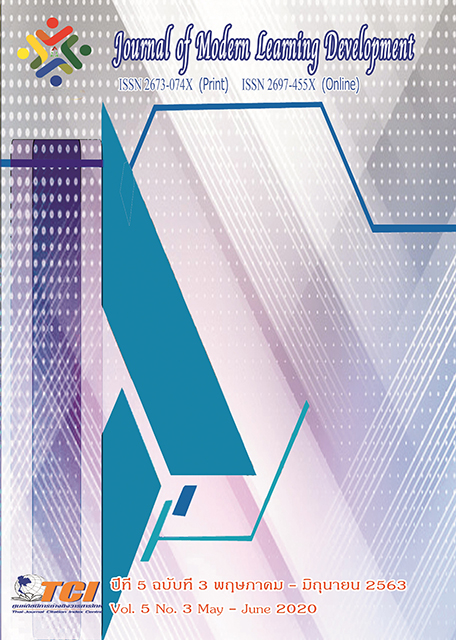Strategic Management Education of Sangha Thailand
Main Article Content
Abstract
This research has objectives. To study the educational administration of the Thai clergy To study the educational management strategies of the Thai clergy And to propose educational management strategies of the Thai clergy This research is an integrated research which has an interview (Interviews) tool and uses descriptive and inferential statistics to analyze data according to the quantitative research process, amount 25 images / person and take the results. The research, obtained from quantitative research, conducted in depth interviews of 5 specific forms and content analysis.
The results of the research revealed that the educational administration of all 4 Thai monks were appropriate at a high level, namely general administration. Academic administration Budget management And personnel management respectively
The study of the educational management strategies of Thai monks in all 4 aspects, namely, organizing the curriculum in accordance with the core curriculum Organize learning-centered learning And continuously develop the educational quality assurance system Make a budget plan Recruiting budgets through multiple channels And meeting budget expenditures once a month, developing human resource development plans Establish personnel according to knowledge, ability, and carry out the government regulations Administrators have dharma principles. Set goals according to the school's policy. And stimulate desire through temptation
Strategies for educational administration of the Thai clergy Consisting of self-management, human resource management and management with the aim of adjusting one's own attitudes and attitudes of colleagues, establishing working networks, developing personnel to meet competency, and planning management in all 4 areas through the PS-GANPPI MODEL to The efficiency of educational administration of the Phrapariyattidhamma schools General Education Department, model of sustainable Thai clergy.
Article Details
References
กนกวรรณ โกมลิทธิพงศ์. (2550) การบริหารกิจการของคณะสงฆ์จีนนิกายในประเทศไทย.พุทธศาสตรดุษฎีบัณฑิต.สาขาวิชาพระพุทธศาสนา. บัณฑิตวิทยาลัย: มหาวิทยาลัยมหาจุฬาลงกรณราชวิทยาลัย.
คณาจารย์มหาวิทยาลัย. (2551). การปกครองคณะสงฆ์ไทย. กรุงเทพมหานคร: โรงพิมพ์มหาจุฬาลงกรณราชวิทยาลัย.
เจริญ ราชโสภา. (2554). การพัฒนารูปแบบการบริหารจัดการงานวิชาการแบบมีส่วนร่วมของสถานศึกษา. วิทยานิพนธ์การศึกษาดุษฎีบัณฑิต. สาขาวิชาการบริหารและพัฒนาการศึกษา.บัณฑิตวิทยาลัย: มหาวิทยาลัยมหาสารคาม.
พระครูใบฎีกาบุญชู ชุติปณโญ (บุญวงศ์). (2554). รูปแบบการบริหารโรงเรียนพระปริยัติธรมแผนกสามัญศึกษา. ดุษฎีบัณฑิต. สาขาวิชาการบริหารการศึกษา. บัณฑิตวิทยาลัย: มหาวิทยาลัยวงษ์ชวลิตกุล.
พระอาโซ เสี่ยกัง (มาเยอะ). (2558). การศึกษาการจัดการเรียนการสอนโรงเรียนพระปริยัติธรรมแผนกสามัญศึกษา อำเภอแม่จัน จังหวัดเชียงราย. วิทยานิพนธ์พุทธศาสตรมหาบัณฑิต. บัณฑิตวิทยาลัย: มหาวิทยาลัยมหาจุฬาลงกรณราชวิทยาลัย.
ลิขสิทธิ์ สิงห์งอย. (2552). การใช้สื่อการสอนของครู-อาจารย์ โรงเรียนพระปริยัติธรรม แผนกสามัญศึกษา จังหวัดนครพนม. ปริญญานิพนธ์ศึกษาศาสตรมหาบัณฑิต. บัณฑิตวิทยาลัย: มหาวิทยาลัยมหาสารคาม.
สาย แวงคำ. (2554). ปัญหาการบริหารงานวิชาการในโรงเรียนพระปริยัติธรรม แผนกสามัญศึกษา กลุ่ม 9. ปริญญานิพนธ์การศึกษามหาบัณฑิต. บัณฑิตวิทยาลัย: มหาวิทยาลัยมหาสารคาม.
สำนักงานคณะกรรมการการศึกษาขั้นพื้นฐาน. (2559). พระราชบัญญัติการศึกษาแห่งชาติ พ.ศ. 2545. กรุงเทพมหานคร: โรงพิมพ์คุรุสภาลาดพร้าว.


